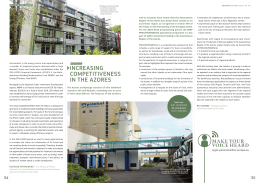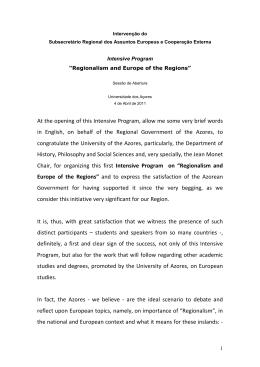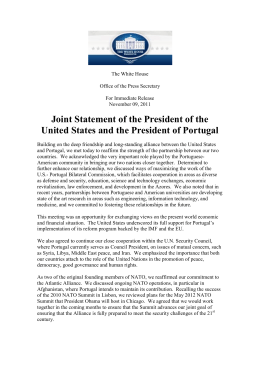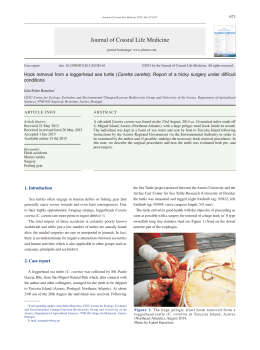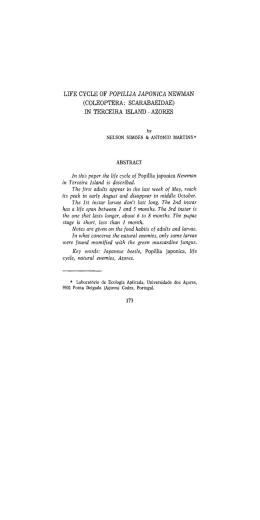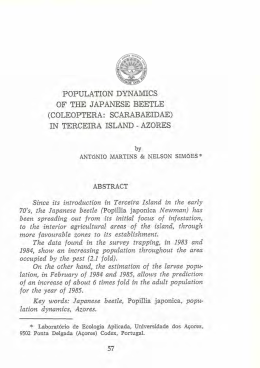SHORT COMMUNICATION First records of Tarentola mauritanica (Linnaeus, 1758) (Reptilia; Gekkonidae) in the Azores JOÃO P. BARREIROS, R.B. ELIAS, J. LOURENÇO, E. DIAS & P. BORGES Barreiros, J.P., R.B. Elias, J. Lourenço, E. Dias & P. Borges 2010. First records of Tarentola mauritanica (Linnaeus, 1758) (Reptilia; Gekkonidae) in the Azores. Arquipelago. Life and Marine Sciences 27: 73-75. João Pedro Barreiros (e-mail: [email protected]),aDepartamento de Ciências Agrárias, Universidade dos Açores, PT-9701-851 Angra do Heroísmo, Portugal; IMAR, Centro do Imar da Universidade dos Açores, PT-9901-962 Horta, Portugal; Rui B. Eliasa, Joana Lourençoa & Eduardo Diasa, Centro do Clima Meteorologia e Mudanças Globais (C-CMMG; CITA-A), Departamento de Ciências Agrárias, Universidade dos Açores, Terra-Chã, PT-9701-851 Angra do Heroísmo, Portugal; Paulo Borgesa, Azorean Biodiversity Group (CITA-A), Departamento de Ciências Agrárias, Universidade dos Açores, Terra-Chã, PT-9701-851 Angra do Heroísmo, Portugal INTRODUCTION The Moorish gecko Tarentola mauritanica (Linnaeus, 1758) is a widespread species native to the Mediterranean region from southern France to Greece and northern Africa (Loveridge 1947; Martínez-Rica 1997; Hódar 2002; Perera et al. 2008, 2010; Plezeguelos et al. 2008). It has recently been reported as living and breeding in California (Marhdt 1998) and also as an introduced species in Madeira (Báez & Biscoito 1993). Tarentola mauritanica is paraphyletic with respect to T. angustimentalis Steindachner, 1891, a Canary Islands endemic (Harris et al. 2004a). Here we report new occurrences of the Moorish gecko on Terceira Island, Azores archipelago, and 3 other occurrences on the islands of São Miguel and Faial. The possibility of an already established breeding population is discussed. MATERIAL AND METHODS Two live specimens of Tarentola mauritanica were collected in the central area of the city of Fig. 1. A juvenile Tarentola mauritanica collected in June 2009 inside a house on the outskirts of Angra do Heroísmo, Terceira Island. Photo by R.E. 73 Table 1. Dates and locality of confirmed sightings/collection of Tarentola mauritanica in the Azores. Island Terceira Terceira São Miguel São Miguel São Miguel São Miguel Faial Locality Angra do Heroísmo Angra do Heroísmo Ponta Delgada Ponta Delgada Fajã de Cima Pico Salomão Horta Date Jan 2007 Nov 2007 2002 2002-2009 2002-2009 2010 2009 RESULTS AND DISCUSSION Fig. 2. An adult, tailless, Tarentola mauritanica, caught in July 2009 inside a box of lettuce imported from mainland Portugal and put for sale in a supermarket on the outskirts of Angra do Heroísmo, Terceira Island. Photo by R.E. Angra do Heroísmo, Terceira Island, Azores. On 1 January 2010 a juvenile of 42 mm Total length (Fig. 1) (specimen A) was captured by one of the authors (JL) outside his house after an adult had been killed and two other animals had been seen alive in the same house as well as one in a neighbouring house (pers. comm. to R.E.). A second specimen (specimen B), caught alive on 2 November 2007 by one of the authors (JPB) from a box of lettuce imported from mainland Portugal, was kept in a terrarium until 1of March 2008. When it died the length without tail was of 93 mm (Fig. 2). Table 1 summarises the known occurrences of T. mauritanica in the Azores. The specimens were fixed in 10% formalin and preserved in 70% alcohol and deposited in the Arruda Furtado collection of Department of Agriculture (University of the Azores) under the provisional catalogue numbers, EFAF_R0001 and EFAF_R0002, respectively. 74 As reported by Báez & Biscoito (1993) for Madeira, the Moorish gecko seems also to be an accidental anthropogenic introduction in the Azores. Although our specimen B was clearly a case of an adult imported from mainland Portugal inside a box of lettuce, specimen A was probably born on the island, due to its small size and reports of adults around the same area. The absence of native populations of geckos in the Azores implies that the native invertebrate species did not co-evolve with this predator, in fact with any similar one, being eventually vulnerable to increase predation at least in less impacted and preserved areas. However, it is not clear which will be the habitat selection of Tarentola mauritanica in the Azores due to the species’ rate of adaptability and genetic differences between known populations (see Carranza 2000, 2002; Harris et al. 2004a,b). If the species becomes restricted to low altitude urban areas the impact on native invertebrate species will be minimal. Inconclusive evidence via anectodical reports suggests that Tarentola mauritanica is limited to sites under anthropogenic influence mainly on low altitude urban place. The antropophilic nature of this species is suggested by Hódar (2002). Recent reports of live specimen from Faial and São Miguel islands, in the Azores (photos and pers. comm. to P. Borges) show specimen apparently well adapted to coastal and urban environments such as airports and industrial areas. Only one sighting is confirmed from higher altitudes (Pico Salomão, S. Miguel Island, pers. comm. to P. Borges). ACKNOWLEDGEMENTS The authors are grateful to people who are getting interested and have given information about the presence of the Moorish gecko in the Azores islands, mainly São Miguel, Terceira and Faial. Map generated by Dinis Pereira, C-CMMG; CITA-A. REFERENCES Carranza, S., Arnold, E.N., Mateo, J.A. & L.F. LopezJurado 2000. Long-distance colonization and radiation in gekkonid lizards, Tarentola (Reptilia: Gekkonidae), revealed by mitochondrial DNA sequences. Proceedings of the Royal Society B 267(1444), 637-649. Carranza, S., Arnold, E.N., Mateo, J.A. & P. Geniez 2002. Relationships and evolution of the North African geckos, Geckonia and Tarentola (Reptilia: Gekkonidae), based on mitochondrial and nuclear DNA sequences. Molecular Phylogenetics and Evolution 23(2), 244-256. Báez, M. & M. Biscoito 1993. First record of Tarentola mauritanica (Linneus, 1758) from the island of Madeira. Macaronesian Congress, 1993. Harris, D.J., V. Batista, P. Lymberakis & M.A. Carretero 2004a. Complex estimates of evolutionary relationships in Tarentola mauritanica (Reptilia: Gekkonidae) derived from mitochondrial DNA sequences. Molecular Phylogenetics and Evolution, 30(3): 855-859. Harris, D.J., Batista, V., Carretero, M.A. & N. Ferrand 2004b. Genetic variation in Tarentola mauritanica (Reptilia: Gekkonidae) across the Strait of Gibraltar derived from mitochondrial and nuclear DNA sequences. Amphibia-Reptilia 25(4), 451459. Hódar, J.A. 2002. Tarentola mauritanica. Pp. 188-190 in: Plezeguelos, J.M., Márquez, R. & Lizana M. (Eds.). Atlas y Libro Rojo de los Anfíbios y Reptiles de España. Vol. II, Dirección General de Conservación de la Naturaleza – Asociación Herpetologica Española, Madrid. Loveridge, A. 1947. Revision of the African Lizards of the Family Gekkonidae. Bulletin of the Museum of Comparative Zoology 98: 1-469. Mahrdt, C.R. 1998. Geographic Distribution of Tarentola mauritanica. Herpetological Review 29(1): 52. Martínez-Rica, J.P. 1997. Tarentola mauritanica. Pp. 202–204 in Pleguezuelos, J.M. & Martínez-Rica J.P. (Eds). Distribución y biogeografía de los Anfibios y Reptiles de España y Portugal. Monografías de Herpetología 3. Universidad de Granada-AHE, Granada. Perera, A., V. Batista & D.J. Harris 2008. Tarentola mauritanica. Pp. 136-137 in: Loureiro, A., Ferrand de Almeida, N., Carretero, M.A. & Paulo O.S. (Eds). Atlas dos Anfíbios e Répteis de Portugal. Instituto da Conservação da Natureza e Biodiversidade, Lisboa. Perera, A., V. Batista & D.J. Harris 2010. Tarentola mauritanica. Pp. 132-133 in: Loureiro, A., Ferrand de Almeida, N., Carretero, M.A. & Paulo O.S. (Eds). Atlas dos Anfíbios e Répteis de Portugal. Esfera do Caos editores, Lisboa. Pleguezuelos, J., El Din, S.B. & I. Martínez-Solano 2008. Tarentola mauritanica: IUCN 2010. IUCN Red List of Threatened Species. Version 2010.1. Accepted 7 June 2010. 75
Download

